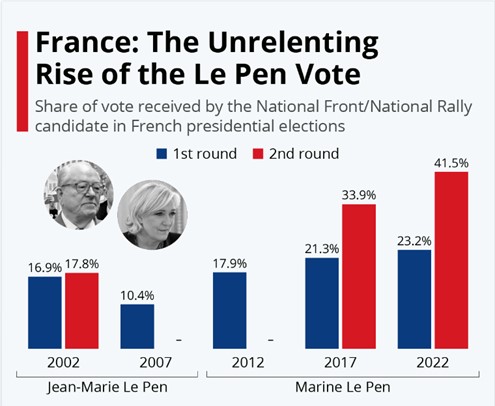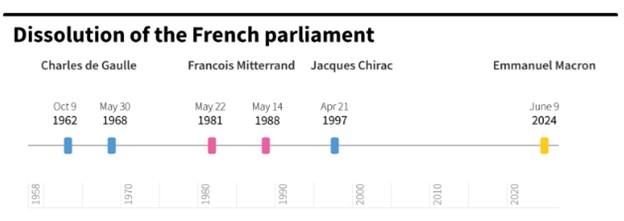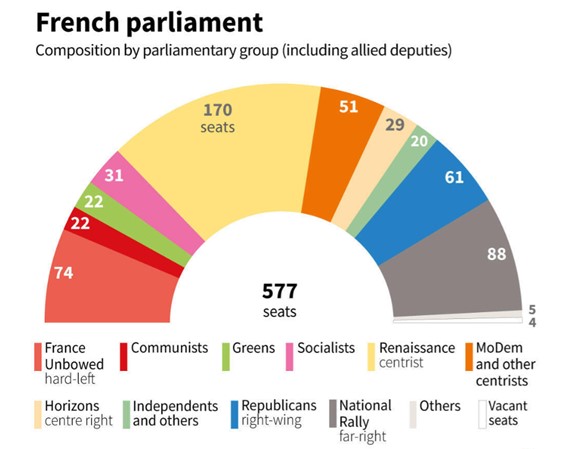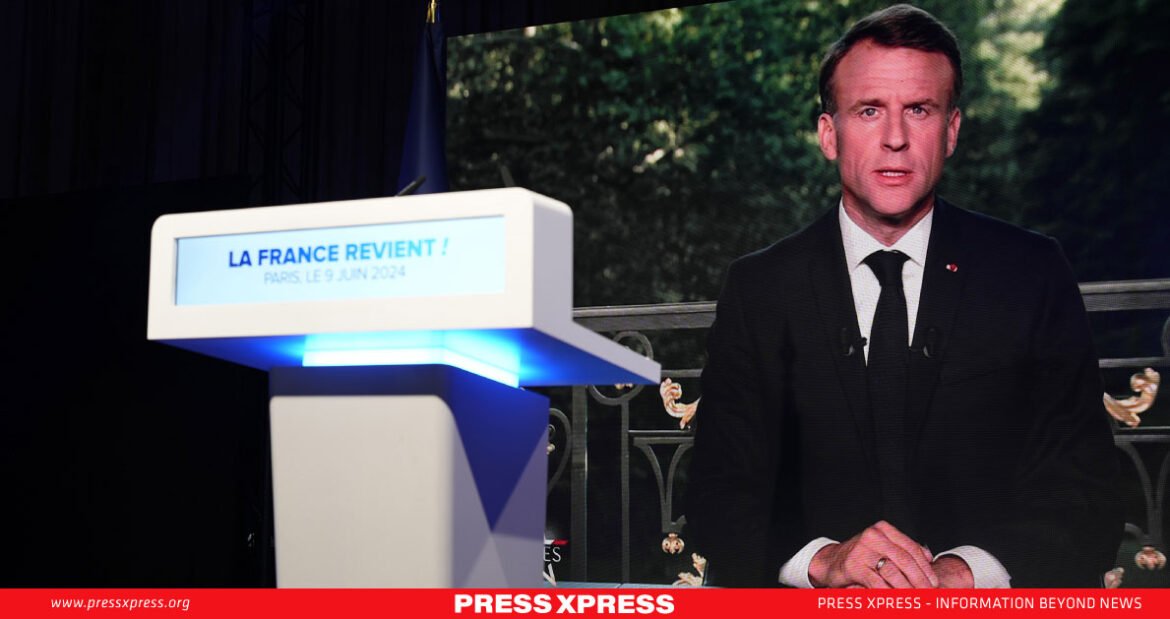Key Highlights:
- French President Emmanuel Macron unexpectedly dissolved the lower house of the parliament
- A snap election, in a parliamentary system, is an election called earlier than scheduled, often to capitalize on favorable circumstances for the ruling party
- If the National Rally or another party wins a majority, Macron would be forced to appoint a prime minister from their ranks, leading to a cohabitation situation
French President Emmanuel Macron unexpectedly dissolved the lower house of the parliament, prompting new elections in the coming weeks after his party suffered a significant defeat by Marine Le Pen’s far-right National Rally (RN) in the recent European elections. The legislative elections will occur in 2 rounds on June 30 and July 7.
You Can Also Read: HOW FRANCE’S HISTORIC AMENDMENT LIBERATES WOMEN GLOBALLY?
This announcement followed the initial results from France, which showed the far-right National Rally party leading in the European Union’s parliamentary elections, delivering a severe setback to Macron’s pro-European centrists, according to French opinion poll institutes.
The far-right RN party secured the highest percentage of votes in France at 31.5%, as voters across the European Union elected their members of the European Parliament. Following the RN, President Macron’s Renaissance coalition held on to second place with 14.5%, slightly ahead of the Socialists and their lead candidate, Raphaël Glucksmann, who garnered 14%.

Macron was re-elected in 2022. His current term will conclude in the spring of 2027, and he is ineligible for re-election.
What Political Strategy is Macron Brewing?
A snap election, in a parliamentary system, is an election called earlier than scheduled, often to capitalize on favorable circumstances for the ruling party or decide a pressing issue. It differs from a recall election as it’s initiated by politicians, not voters, and from a by-election as an entirely new parliament is elected.
Incumbent parties often benefit by timing snap elections advantageously, potentially increasing their majorities. Since losing his parliamentary majority in the 2022 elections, the French president’s centrist coalition has had to rely on a contentious constitutional tool, known as 49/3, to pass legislation without a parliamentary vote.

Unlike European elections, French parliamentary elections require a candidate to secure 50% of the vote in the first round or face a run-off, making it significantly more challenging for far-right candidates to win seats in the national parliament.
It means, Macron’s strategy is straightforward and aims to bring Le Pen back to reality. The president acknowledged the gravity of the decision, stating that he could not accept the growing influence of far-right parties across the continent. He referred to it as “an act of confidence,” expressing his belief in French voters and their ability to make the best choices for themselves and future generations.
Far-Right Demands Course Correction After Verdict
Jordan Bardella, the president of RN, was the first to urge Macron to call for snap legislative elections. Speaking to supporters after the projections were announced, he stated that French voters had “expressed a desire for change.” He added, “The country has given its verdict and there is no appeal.”
Le Pen “welcomed” Macron’s move, stating, “We’re ready to exercise power if the French people place their trust in us in these future legislative elections. We’re ready to turn the country around, ready to defend the interests of the French, ready to put an end to mass immigration, and ready to make the purchasing power of the French a priority.”
Macron’s Mandate: Echoes of France’s Turbulent Political Past?
Past presidents have dissolved parliament in several instances, notably in 1962, 1968, 1981, and 1988. At that time, the presidential term lasted 7 years while the parliamentary term was 5, often leading to a situation where the president faced a hostile majority in the assembly.
This strategy has not always been beneficial. In 1997, center-right President Jacques Chirac called for early legislative elections, which resulted in a left-wing majority, forcing him into 5 years of “cohabitation.”
No president has dissolved parliament since then, partly because the terms were aligned in 2000. Since this synchronization, voters have typically given each newly elected president a parliamentary majority – until Macron’s re-election.

What Might Resonate in its Aftermath?
Macron’s Renaissance Party has the largest grouping of 169 lawmakers in the 577-seat National Assembly, while Le Pen’s National Rally party is the largest opposition with 88 seats. His decision to dissolve the National Assembly means there are no recent voter surveys on the potential composition of a new assembly after fresh elections.
The National Rally’s strong performance in the European election indicates voter discontent over issues like immigration, crime, and the cost of living. To secure a majority in the lower house, the party would need to increase its number of lawmakers to 289.
If the National Rally or another party wins a majority, Macron would be forced to appoint a prime minister from their ranks, leading to a cohabitation situation. Cohabitation can create policy uncertainty if the president and prime minister disagree, potentially unsettling markets, as reflected in bond spreads. Le Pen’s manifesto advocates prioritizing social housing for French nationals, processing asylum requests outside of France, and scrapping inheritance tax for middle-class and low-income families. While the president leads on defense and military issues, the prime minister and government would have some say, leaving room for divisions in opinion, depending on the dynamic between the two leaders.

Macron stands firmly as a supporter of European unity, contrasting sharply with Le Pen and her party, who harbor aspirations of dismantling the EU from within. Despite the barrier of two-round elections preventing the far right from seizing power thus far, voters are increasingly wary of consistently backing the anti-Le Pen coalition. Consequently, the outcome of the impending election looms with unprecedented unpredictability.


